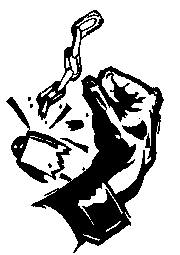
BOSTON, Mass., March 24 -- RAIL held a forum on the criminal injustice system at Boston University that included three former prisoners, an activist lawyer and a RAIL activist. The event was well attended and the discussion ran well into the night as many activists and people interested in getting involved in activism shared stories about police brutality, discussed what we can do about the unjust system, and listened intently to the experiences and information from the speakers.
Frank Smith (a.k.a. Big Black), a former Attica prisoner who participated in the 1971 uprising demanding livable conditions for the prisoners was the featured speaker. He described the Attica rebellion and the way the pigs stormed the prison and killed and injured many people in the process. He is active with the Attica Legal Defense and there are several on-going legal cases against the injustice system for their actions at Attica. Black recently won 4 million dollars in his damage trial. The verdict is being appealed so he does not have any of this money but he pointed out the important legal precedents being set by the cases the Attica prisoners are pursuing. |

Black stressed the importance of everyone getting involved and actually doing something. And this theme was echoed by the other speakers as we encouraged people to join the RAIL contingent to the Jericho march and teach-in or to get involved in some other way.
Kazi Toure, imprisoned for 10 years for seditious conspiracy (conspiring to overthrow the government), spoke about the many prisoners who have been incarcerated specifically for their political beliefs and actions. He described how he was sitting in a parked car when a cop came and asked the driver as well as Kazi for identification. They then tried to search Kazi. At the trial when the cop was asked what basis he had for the stop and the search he said that he never saw Black men sitting with white men in a car at that rest stop. He said he had only seen 4 or 5 other Black men at the rest stop ever. And when asked how many of those he had asked for ID hesaid all of them.
Kazi was subject to illegal search and seizure but because the government considered the seditious conspiracy case against him to be so "serious" they dismissed the complaints about illegal actions by the cops. This lack of any legal protection against the cops or the state was stressed by the lawyer on the panel. He stressed that political people are framed for crimes they never committed on a regular basis and we should not expect to win these cases in the courts (except very rarely). The entire system is stacked against the defendant whether s/he is political or not.
Richard Picariello, also imprisoned for political activism spoke about his experience with repression behind the bars in response to his attempts to organize and defend the prisoners. He brought the issue to a larger context by talking about the entire Amerikan system which needs to be overthrown if we hope to change the criminal injustice system. He also stressed the lack of any rehabilitative measures in the prisons. This was echoed by the RAIL activist's talk which focused on the censorship battles RAIL and MIM have been fighting inside the prisons as an example of theuse of prisons as a means of social control.
One of the panel members pointed out that there was a rebellion at Walpole prison (a prison in Massachusetts) just four days earlier and when he asked, no one in the audience had heard about it. This led to a discussion of how the mainstream media can not be counted on to report on the peoples struggles and why we need independent media.
When one audience member talked about the reforms he considered necessary to change the system Kazi said that reforms are good but we need revolution to make the fundamental changes that are necessary. This evoked spontaneous applause from many in the audience.
A few people stressed the strength of the state and their fear of the cops and the power of the state. Several panel members responded that it is important not to be paralyzed by this fear: we have to do something to fight the system. The RAIL activist pointed out that this fear is healthy because it means people are accurately assessing the strength of the state and will not engage in premature armed struggle or other inappropriate actions at this stage in the struggle. But at the same time this strengthof the state is a strong reason why RAIL is a continental organization: we can't afford to think small, we must build organizations that can take on the power of the imperialist state.